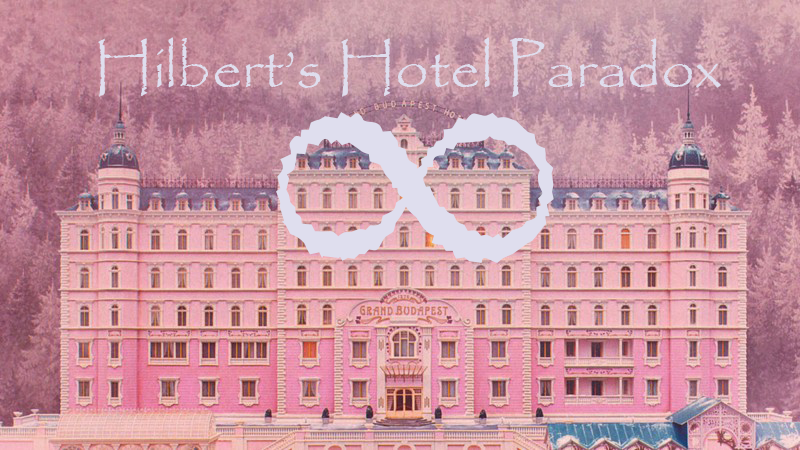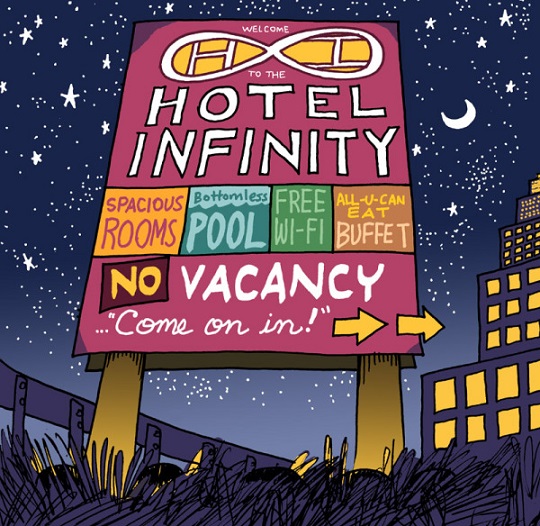In the 1920s a German Mathematician David Hilbert introduced a thought experiment that helped people wrap their minds around the concept of infinity. Imagine an infinitely large hotel, with an infinite number of rooms and a very hardworking night manager.
On a particular night that the hotel is full, a guest walks in at midnight and asks for a room.
Now our night manager won’t turn him down. Instead, he asks the guest in room number 1, to move to room number 2. The guest in room number 2 to number 3, until the guest in room number n moves to room number (n+1).
n → (n+1)
Pleased with himself for having settled the new guest the night manager steps out of the hotel. Wait. What does he see? An infinitely large tour bus containing an infinite number of people, all asking for a room.
What do you think our night manager did?
Well, the night manager asks the guest in room number 1 to move to room number 2. The guest in room number 2 to move to room number 4. The guest in room number 3 to move to room number 6.
Do you see the pattern?
n → 2n
He asks the guest in room number n to move to room number 2n: accommodating the existing guests to the even-numbered rooms and freeing up all the odd-numbered rooms for the new guests. We know that there are an infinite number of even numbers and an infinite number of odd numbers.
Word spreads about this infinite hotel, and one night the unthinkable happens. The night manager steps out of the hotel to see an infinite number of, infinitely large tour buses; EACH carrying an infinite number of people, ALL asking for a separate room.
Our night manager is freaked!!
Luckily, he remembered that around the year 300 BCE, Euclid found that there are an infinite number of prime numbers. A prime number is a number that has only two factors, 1 and itself. Prime numbers go from 2, 3, 5, 7, 11, 13…all the way up to infinity.
Now, the night manager takes the first prime number, 2, and asks the existing guests to move to, 2 to the power of their room number.
let p∈{set of all prime numbers}; then n → pn
That is if you were in room number 1, now you’ll be moving to room number 2 to the power 1. If you were in room number 2 you’ll be moving to room number 2 to the power 2.
1 → 21 = 2
2 → 22 = 4
Then he assigns the next prime number, 3, to the first tour bus. Now if you were in seat number 1, you’ll be moving to room number 3 to the power 1. If you were in seat number 2, you’ll be moving to room number 3 to the power 2
1 → 31 = 3
2 → 32 = 9
Since there are an infinite number of prime numbers each bus will get one, and since they are prime numbers, no two guests will get the same room number.
This way everybody gets a room and the night manager gets to keep his job.
An Infinite Hotel
The interesting fact here is, there will still be rooms that go unoccupied. For example, room number 6 because 6 is not a power of any prime number.
Our night manager’s job is actually made easy because while an infinite hotel is a logistical nightmare, it only deals with the lowest level of infinity- the countable infinity of the natural numbers. 1,2,3,4… and so on. We used natural numbers for the room numbers as well as the seat numbers.
The night manager’s strategies wouldn’t even begin to work with a real number infinite hotel room, with negative number rooms in the basement, fractional number rooms, room number square root 2, and even room number pi- where guests probably expect free dessert!
Over at Hilbert’s Infinite Hotel, where there is never any vacancy and always room for more, we understand just how hard it is for our relatively finite mind to grasp a concept as large as infinity.
Image Courtesies:
01.Featured image: https://bit.ly/3o3Av02
02.Image 01: https://bit.ly/2Jm8Qs8
References:
01. https://ed.ted.com/lessons/the-infinite-hotel-paradox-jeff-dekofsky
Written by Chandula Fernando


